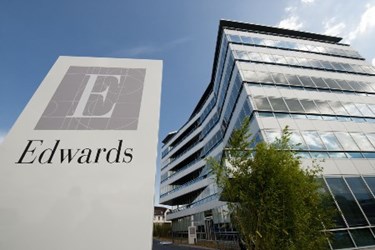Edwards Lifesciences CEO Pleased With TAVR Growth Despite Slowdown
By Jof Enriquez,
Follow me on Twitter @jofenriq

Edwards Lifesciences is optimistic on the long-term growth prospects of transcatheter aortic valve replacement (TAVR), even though sales of the company's Sapien heart valves during the third quarter of 2016 were lower than expected.
Sapien sales increased 38.5 percent to $410.1 million for the period, down from the $427.1 million estimated by analysts, according to FactSet, reports the Wall Street Journal.
Sales for its minimally invasive heart valves, which continue to drive the company's financial results, were strong in the United States, Japan, and most of Europe, except France, where authorities implemented a reimbursement quota for TAVR procedures that reduced shipments there.
"But we feel pretty good about the way things are going. The situation in France was one that was unexpected. We didn't expect it to hit us in the third quarter. So that was a little bit of a curve ball, but not much else is off track," Michael A. Mussallem told analysts during an earnings call, according to a Seeking Alpha transcript. He said they are negotiating with French officials about the policy, and a resolution should be reached soon.
Mussallem said the company is reiterating transcatheter heart valve sales guidance of between $1.5 billion to $1.7 billion, based on strong overall financial results. Total revenue was up 20 percent from $615.5 million to $739.4 million, and profits increased 20 percent from $118.1 million to $141.4 million, year-on-year.
“We continue to expect our 2016 underlying sales growth to exceed 30% as momentum of global therapy adoption remains strong,” he said. “Our dossiers are so strong on TAVR and its value proposition that that situation is improving over time.”
Edwards estimates the global TAVR market to be worth as much as $5 billion by 2021, as minimally-invasive therapies become increasingly preferred by heart patients and surgeons alike.
In August, the company won FDA approval for expanded indications for its Sapien 3 transcatheter heart valves, allowing them to be used in intermediate-risk patients suffering from aortic valve stenosis, significantly adding to the number of potential recipients of said devices. It was the first TAVR therapy to obtain that indication in the U.S., and provides Edwards a leg up over Medtronic and other competitors. Edwards also received CE Mark in Europe for expanded intermediate-risk indication for Sapien 3 last month.
To further improve its aortic and mitral transcatheter valve programs, Edwards said it increased R&D investments by 12 percent during the third quarter, versus Q3 2015, to $113 million, or 15.3 percent of sales.
"As patients and clinicians increasingly prefer TAVR, we remain as optimistic as ever about the long-term growth opportunity. We are committed to aggressively investing in our future, consistent with our focused innovation strategy, and we are confident that these investments will result in innovative therapies that will enable us to treat a broader group of patients and drive continued strong organic growth," said Mussallem.
The company also increased investments in structural heart initiatives with the benefit of this year's medical device excise tax suspension. In particular, in their CardiAQ mitral valve replacement program, Edwards said they are developing system enhancements and their clinical investigators are working on an improved transseptal delivery approach in a U.S. early feasibility study.
Edwards CFO Scott Ullem told analysts that the company will likely continue to shun big deals, and focus on "episodic acquisitions" as well as "smaller investments, minority investments, options to buy companies, funding, start up, joint venture types of companies.”
